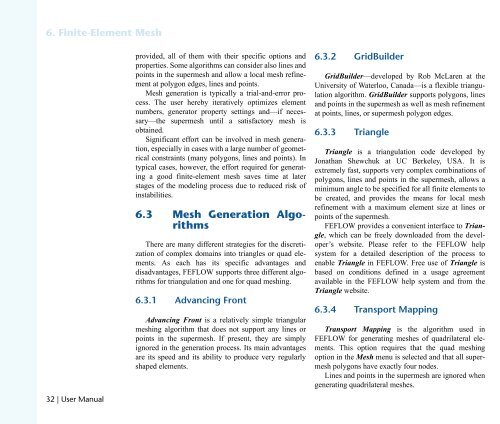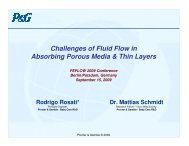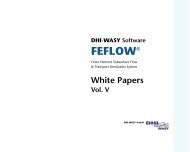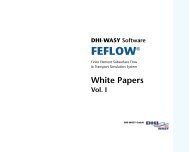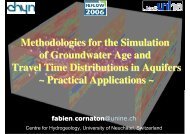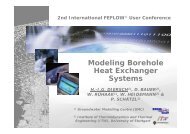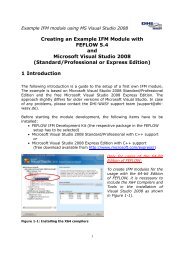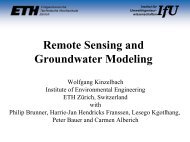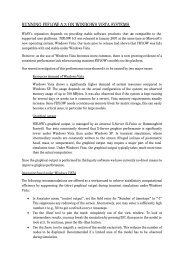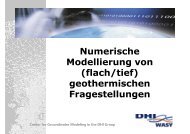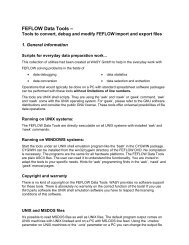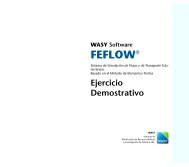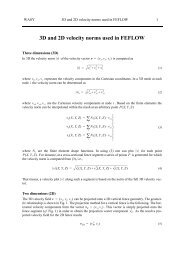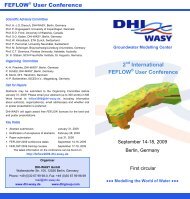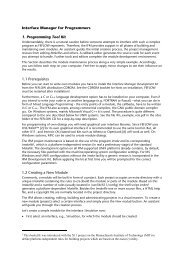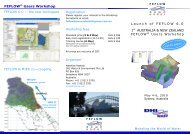DHIJWASv Software FEFLOW 6.1
DHIJWASv Software FEFLOW 6.1
DHIJWASv Software FEFLOW 6.1
Create successful ePaper yourself
Turn your PDF publications into a flip-book with our unique Google optimized e-Paper software.
SK=cáåáíÉJbäÉãÉåí=jÉëÜ<br />
PO=ö=rëÉê=j~åì~ä<br />
provided, all of them with their specific options and<br />
properties. Some algorithms can consider also lines and<br />
points in the supermesh and allow a local mesh refinement<br />
at polygon edges, lines and points.<br />
Mesh generation is typically a trial-and-error process.<br />
The user hereby iteratively optimizes element<br />
numbers, generator property settings and—if necessary—the<br />
supermesh until a satisfactory mesh is<br />
obtained.<br />
Significant effort can be involved in mesh generation,<br />
especially in cases with a large number of geometrical<br />
constraints (many polygons, lines and points). In<br />
typical cases, however, the effort required for generating<br />
a good finite-element mesh saves time at later<br />
stages of the modeling process due to reduced risk of<br />
instabilities.<br />
SKP jÉëÜ= dÉåÉê~íáçå= ^äÖçJ<br />
êáíÜãë<br />
There are many different strategies for the discretization<br />
of complex domains into triangles or quad elements.<br />
As each has its specific advantages and<br />
disadvantages, <strong>FEFLOW</strong> supports three different algorithms<br />
for triangulation and one for quad meshing.<br />
SKPKN ^Çî~åÅáåÖ=cêçåí<br />
Advancing Front is a relatively simple triangular<br />
meshing algorithm that does not support any lines or<br />
points in the supermesh. If present, they are simply<br />
ignored in the generation process. Its main advantages<br />
are its speed and its ability to produce very regularly<br />
shaped elements.<br />
SKPKO dêáÇ_ìáäÇÉê<br />
GridBuilder—developed by Rob McLaren at the<br />
University of Waterloo, Canada—is a flexible triangulation<br />
algorithm. GridBuilder supports polygons, lines<br />
and points in the supermesh as well as mesh refinement<br />
at points, lines, or supermesh polygon edges.<br />
SKPKP qêá~åÖäÉ<br />
Triangle is a triangulation code developed by<br />
Jonathan Shewchuk at UC Berkeley, USA. It is<br />
extremely fast, supports very complex combinations of<br />
polygons, lines and points in the supermesh, allows a<br />
minimum angle to be specified for all finite elements to<br />
be created, and provides the means for local mesh<br />
refinement with a maximum element size at lines or<br />
points of the supermesh.<br />
<strong>FEFLOW</strong> provides a convenient interface to Triangle,<br />
which can be freely downloaded from the developer’s<br />
website. Please refer to the <strong>FEFLOW</strong> help<br />
system for a detailed description of the process to<br />
enable Triangle in <strong>FEFLOW</strong>. Free use of Triangle is<br />
based on conditions defined in a usage agreement<br />
available in the <strong>FEFLOW</strong> help system and from the<br />
Triangle website.<br />
SKPKQ qê~åëéçêí=j~ééáåÖ<br />
Transport Mapping is the algorithm used in<br />
<strong>FEFLOW</strong> for generating meshes of quadrilateral elements.<br />
This option requires that the quad meshing<br />
option in the Mesh menu is selected and that all supermesh<br />
polygons have exactly four nodes.<br />
Lines and points in the supermesh are ignored when<br />
generating quadrilateral meshes.


